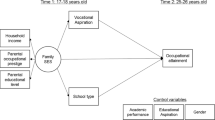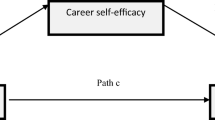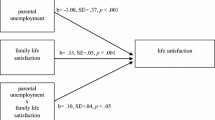Abstract
Unemployment is considered to be a personal andfamily crisis that damages the routine offamily life. This study explores the relationsbetween father's unemployment and three careerrelated variables of his adolescent children:work values, career maturity, and expectationsfor success in work. Based on the assumptionthat the father's employment status and theatmosphere in the home are primary factorsinfluencing adolescents' career development,specific career related differences wereexpected between adolescents with employedversus unemployed fathers. Participantscomprised 91 eleventh and twelfth gradestudents (42 males and 49 females) from twocities in Israel, of whom 45 had an unemployedfather. Two-way analysis of variancedemonstrated that adolescents with employedfathers demonstrated significantly higherexpectations for success than those withunemployed fathers, with a larger differencefound for females. Similar differences betweengroups were also found in four of the workvalue subscales and in the extrinsic valuedimension; however, differences in the careermaturity were not significant. Implications forother research and for career counselors arediscussed.
Similar content being viewed by others
References
Abramovitch, R. & Johnson, L.C. (1992). Children's perceptions of parental work. Canadian Journal of Behavior Science 24: 319-332.
Barling, J. (1990). Employment, Stress and Family Functioning. New York: Wiley.
Agassi, J. (1982). Comparing the work Attitudes of Men and Women. Lexington, MA: Lexington Books.
Ashford, S.J.,Lee, C. & Bobko, P. (1989). Content, causes and consequences of job insecurity: A theory-based measure and substantive test. Academy of Management Journal 32: 803-829.
Barling, J.,Dupre, K.E. & Hepburn, C.G. (1998). Effects of parent's job inecurity on children's work beliefs and attitudes. Journal of Applied Psychology 83: 112-118.
Barling, J. & Mendelson, M.B. (1999). Parent's job insecurity affects children's grade performance through the indirect effects of beliefs in unjust world and negative mood. Journal of Occupational Health Psychology 4: 347-355.
Betz, N.E. (1994). Basic issues and concepts in career counseling for women. In W.B. Walsh & S.H. Osipow (eds.), Career Counseling for Women (pp. 1-42). Hillsdale, NJ: Erlbaum.
Betz, N.E. & Fitzgerald, L. (1987). The Career Psychology of Women. San Francisco: Academic Press.
Blustein, D.L.,Prezioso, M.S. & Schultheiss, D.P. (1995). Attachment theory and career development: Current status and future directions. The Counseling Psychologist 23: 416-432.
Borman, C.L.,Hamilton, V.L. & Hoffman, W.S. (1990). Unemployment and its effects on families: Evidence from plant closing study. American Journal of Community Psychology 18: 643-659.
Briar, K. (1988). Unemployment: Toward a social work agenda. Social Work 28: 211-215.
Brown, M.T.,Eisenberg, A.I. & Sawilowsky, S.S. (1997). Traditionality and the discriminating effect of expectations of occupational success and occupational values for women within math-oriented fields. Journal of Vocational Behavior 50: 418-431.
Crites, J.O. (1970). Vocational Psychology. New York: McGrow Hill.
Crites, J.O. (1978). Theory and Research Handbook for the Career Maturity Inventory. CA: McGraw Hill.
Dew, M.A.,Penkower, L. & Bromet, E.J. (1991). Effects of unemployment on mental health in the contemporary family. Behavior Modification 15: 501-544.
Erikson, E.H. (1968). Identity: Youth and Crisis. New York: Norton.
Fassinger, R.E. (1990). Causal models of career choice in two samples of college women. Journal of Vocational Behavior 36: 225-248.
Flanagan, C.A. & Eccles, J.S. (1993). Changes in parents' work status and adolescents' adjustment at school. Child Development 64: 246-257.
Galambos, N.L. & Silbereisen, R.K. (1987). Income change parental life outlook and adolescent expectation for job success. Journal of Marriage and the Family 48: 309-318.
Jahoda, M. (1981). Work, employment, and unemployment: Values theories, and approaches in social research. American Psychologist 36: 184-191.
Kelloway, E.K. & Watts, L. (1994). Pre employment predictors of union attitudes: Replication and extension. Journal of Applied Psychology 79: 631-634.
King, S. (1989). Sex difference in a causal model of career maturity. Journal of Couseling and Development 68: 208-215.
Kulik, L. (2000). The impact of gander and age on attitudes and reactions to unemployment: The Israeli case. Sex Roles 43: 85-104.
Lent, R.W.,Lopez, F.G. & Bieschke, K.J. (1991). Mathematics self efficacy: Sources and relation to science-based career choice. Journal of Counseling Psychology 38: 424-430.
Luzzo, D.A. (1995). Ethnic group and social class differences in college student career development. The Career Development Quarterly 41: 161-173.
Maguire, T.O.,Romaniuk, E.W. & Macrury, K.A. (1982). The development and validitation of an instrument to assess student attitudes toward work. Educational and Psychological Measurement 42: 643.
Mannheim, B. (1988). Social background, schooling, and parental job attitudes as related to adolescents' work values. Youth and Society 19: 269-293.
Mannheim, B. & Seger, T. (1993). Mothers' occupation characteristics, family position, and sex role orientation as related to adolescents' work values. Youth and Society 24: 276-298.
Mortimer, J.T. (1976). Occupational value socialization in business and professional families. Sociological Quarterly 23: 3-16.
Naidoo, A.V. (1993). Factors Affecting the Career Maturity of African American University Students: A Causal Model. Unpublished doctoral dissertation, Ball State University, Muncie, Indiana.
Naidoo, A.V.,Bowman, S.L. & Gerstein, H.L. (1998). Demographics, causality, work salience and the career maturity of African American students: A causal model. Journal of Vocational Behavior 53: 15-27.
Neil, C.C. & Snizek, W.E. (1988). Gender as a moderator of job satisfaction. Work and Occupation 15: 201-219.
O'Brien, K.M. & Fassinger, R.E. (1993). A causal model of the career orientation and career choice of adolescent women. Journal of Counseling Psychology 40: 456-469.
O'Brien, K.M.,Friedman, S.M.,Tipton, L.C. & Linn, S.G. (2000). Attachment, separation, and vocational development: A longitudinal analysis. Journal of Counseling Psychology 47: 301-315.
O'hler, D.L.,Levinson, E.M. & Hays, G.M. (1996). The relationship between congruence, consistency, differentiation, and career maturity among individuals with and without learning disabilities. Journal of Employment Counseling 33: 50-60.
O'hler, D.L.,Levinson, E.M. & Sanders, P. (1995). Career maturity in young adults with learning disabilities: What employment counselors should know. Journal of Employment Counseling 32: 50-60.
O'Neill, H.M. & Lenn, D.J. (1995). Voices of survivors: Words that downsizing CEOs should hear. Academy of Management Executive 9: 25-34.
Otto, L.B. (2000). Youth perspectives on parental career influences. Journal of Career Development 27: 111-118.
Parsons, J. E.,Adler, T. & Kaczala, C. (1982). Socialization of achievement attitudes and beliefs: Parental influences. Child Development 53: 310-321.
Pine, G.J. & Innis, G. (1987). Cultural individual work values. Career Development Quarterly 23: 279-287.
Powell, D.F. & Luzzo, D.A. (1998). Evaluating factors associated with the career maturity of high school students. The Career Development Quarterly 47: 145-157.
Radin, N. & Goldsmith, H.R. (1989). The involvement of selected unemployment and employed men with their children. Child Development 60: 454-459.
Rainey, L.M. & Borders, L.D. (1997). Influential factors in career orientation and career aspiration of early adolescent girls. Journal of Counseling Psychology 44: 160-172.
Read, B.K. (1994). Motivational factors in technical college women's selection of non traditional careers. Journal of Career Development 20: 239-258.
Richardson, M.S. (1993). Work in people's lives: A location for counseling psychologists. Journal of Counseling Psychology 40: 425-433.
Roe, A. (1957). Early determinants of vocational choice. Journal of Counseling Psychology 4: 212-217.
Rojewski, J.W.,Wicklein, R.C. & Schell, J.W. (1995). Effects of gender and academic-risk behavior on the career maturity of rural youth. Journal of Research in Rural Education 11: 92-104.
Saleh, S.D. & Singh, T. (1973). Work values of white-collar employees as a function of sociological background. Journal of Applied Psychology 58: 131-133.
Santos, P.J. & Coimbra, J.L. (2000). Psychological separation and dimensions of career indecision in secondary school students. Journal of Vocational Behavior 56: 346-362.
Savickas, M.L. (1990). The use of career choice measures in counseling practice. In E.Watkins & V. Campbell (eds.), Testing in Counseling Practice (pp. 373-417). Hilldsdale, NJ: Erlbaum.
Seligman, L. (1994). Developmental Career Counseling and Assessment (2nd edn Thousand Oaks, CA: Sage.
Schmitt, N.,Sacco, J.M.,Ramey, C. & Chan, D. (1999). Parental employment, school climate and children's academic and social development. Journal of Applied Psychology 84: 737-753.
Schulenberg, J.E.,Vondracek, F.W. & Crouter, A.C. (1984). The influence of the family on vocational development. Journal of the Marriage and the Family 46: 129-143.
Shamir, B. (1985). SES differences in psychological adjustment of unemployment and reemployment: A question of commitment, alternatives, finance? Social Problems 33: 67-79.
Silbereisen, R.K.,Walper, S. & Albrecht, H.T. (1990). Family income loss and economic hardship: Antecedents of adolescents' problem behavior. In V.C. McLoyd & C.A. Flanagan (eds.), New Direction for Child Development (No. 46). San Francisco: Jossey-Bass.
Stewart,W., & Barling, J. (1996). Father's work experience effect children's behaviors via job related affect and parenting behaviors. Journal of Organizational Behavior 17: 221-232.
Super, D.E. (1957). The Psychology of Careers. New York: Harper & Row.
Super, D.E. (1970). Work Values Inventory Manual. Boston: Houghton Mifflin.
Super, D.E. (1973). The career development inventory. British Journal of Guidance and Counseling 1: 37-50.
Super, D.E. & Bowlsbey, J.A. (1981). Planfulness in the Upper Grades: Report to the Charles County, Maryland board of Education. Maryland Board of Education.
Vondracek, F.W. & Reitzle, M. (1998). The viability of career maturity theory: A developmental-contextual perspective. The Career Development Quarterly 47: 6-15.
Young, R.A.,Friesen, J.D. & Borycki, B. (1994). Narrative structure and parental influence in career development. Journal of Adolescence 17: 173-191.
Young, R.A.,Friesen, J.D. & Dillabough, J.M. (1991). Personal constructions of family influence related to career development. Canadian Journal of Counseling 25: 183-190.
Zunker, V.Z. (1990). Career Counseling: Applied Concept of Life Planning (3rd edn). Brooks, California.
Rights and permissions
About this article
Cite this article
Cinamon, R.G. Father's unemployment andcareer related variables of his adolescentchild. International Journal for the Advancement of Counselling 23, 295–309 (2001). https://doi.org/10.1023/A:1014454927643
Issue Date:
DOI: https://doi.org/10.1023/A:1014454927643




